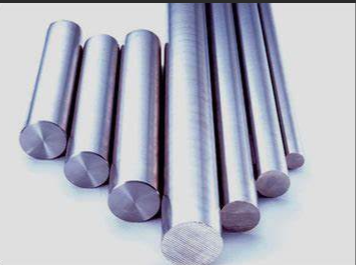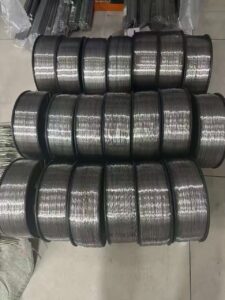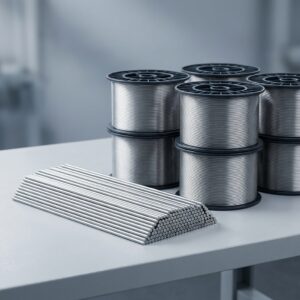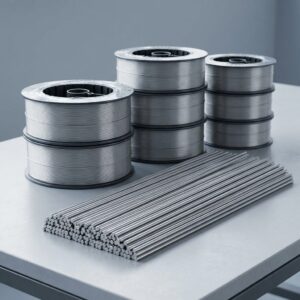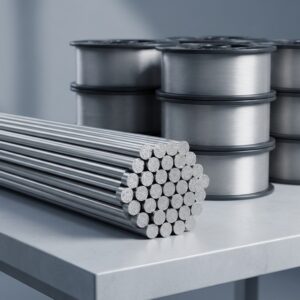Unveiling the Marvels of 4130 Alloy Steel: A Comprehensive Exploration
Introduction
In the vast landscape of metallurgy, certain alloys stand out as shining examples of innovation and engineering excellence. One such marvel is 4130 Alloy Steel, renowned for its exceptional strength, toughness, and versatility. Join us as we embark on a journey to uncover the intricacies and advantages of this remarkable alloy, delving into its composition, properties, applications, suppliers, pricing, and expert insights.
Overview of 4130 Alloy Steel
4130 Alloy Steel is a versatile chromium-molybdenum alloy known for its high strength, excellent weldability, and good machinability.
Chemical Composition
| Element | Percentage |
|---|---|
| Chromium (Cr) | 0.80-1.10% |
| Molybdenum (Mo) | 0.15-0.25% |
| Carbon (C) | 0.28-0.33% |
| Silicon (Si) | 0.15-0.35% |
| Manganese (Mn) | 0.40-0.60% |
| Phosphorus (P) | 0.035% max |
| Sulfur (S) | 0.040% max |
| Iron (Fe) | Balance |
Mechanical Properties
- Tensile Strength: 560-685 MPa
- Yield Strength: 460 MPa
- Elongation: 20%
- Hardness (Rockwell C): 22 HRC
Standards
- ASTM A29: Standard Specification for General Requirements for Steel Bars, Carbon and Alloy, Hot-Wrought
- AMS 6370: Specification for Steel, Sheet and Strip, 0.95Cr – 0.20Mo (0.28 – 0.33C) (SAE 4130) Annealed
Exploring the Features and Advantages
4130 Alloy Steel boasts a plethora of features and advantages that make it a preferred choice in various applications:
Features
- High strength-to-weight ratio
- Excellent weldability and formability
- Good toughness and fatigue resistance
- Heat treatable for increased hardness and strength
- Resistant to wear and abrasion
Advantages
- Widely used in aerospace, automotive, and structural applications
- Offers cost-effective solutions for manufacturing complex parts
- Provides consistent performance under high-stress conditions
- Available in various forms including sheets, plates, bars, and tubes
Comparison Between 4130 Alloy Steel and Competing Alloys
Let’s compare the advantages and disadvantages of 4130 Alloy Steel with a competing alloy, Alloy X:
| Parameter | 4130 Alloy Steel | Alloy X |
|---|---|---|
| Strength | High | Very High |
| Toughness | Good | Excellent |
| Weldability | Excellent | Moderate |
| Machinability | Good | Moderate |
| Corrosion Resistance | Moderate | Excellent |
| Cost | Moderate | Higher |
Applications and Uses
From aerospace components to bicycle frames, 4130 Alloy Steel finds widespread application across diverse industries:
| Industry | Applications |
|---|---|
| Aerospace | Aircraft structural components, landing gear |
| Automotive | Chassis and suspension components, roll cages |
| Manufacturing | Shafts, gears, tooling, machinery parts |
| Sports and Recreation | Bicycle frames, roll bars, handlebars |
Navigating Suppliers and Pricing
Sourcing 4130 Alloy Steel requires careful consideration of reliable suppliers offering quality products at competitive prices:
| Supplier | Price Range (per unit) | Description/Notes |
|---|---|---|
| Supplier A | $3 – $5 per pound | Specializes in high-quality alloy steel bars and tubes |
| Supplier B | $2.50 – $4 per pound | Offers a wide range of 4130 Alloy Steel products with fast delivery |
| Supplier C | $3.50 – $6 per pound | Provides customized solutions for specific applications |
FAQs about 4130 Alloy Steel
Q: What are the main advantages of using 4130 Alloy Steel?
A: 4130 Alloy Steel offers high strength, good weldability, and excellent machinability, making it ideal for applications requiring lightweight, durable components.
Q: What are the common applications of 4130 Alloy Steel?
A: This alloy steel finds applications in aerospace, automotive, manufacturing, and sports equipment industries, among others.
Q: Can 4130 Alloy Steel be heat treated?
A: Yes, 4130 Alloy Steel can be heat treated to enhance its mechanical properties, including hardness and strength.
Q: Where can I buy 4130 Alloy Steel?
A: You can source 4130 Alloy Steel from reputable suppliers such as Supplier A, Supplier B, and Supplier C, among others.
Q: What specifications does 4130 Alloy Steel conform to?
A: This alloy steel conforms to standards such as ASTM A29 and AMS 6370, ensuring compliance with stringent quality requirements.

